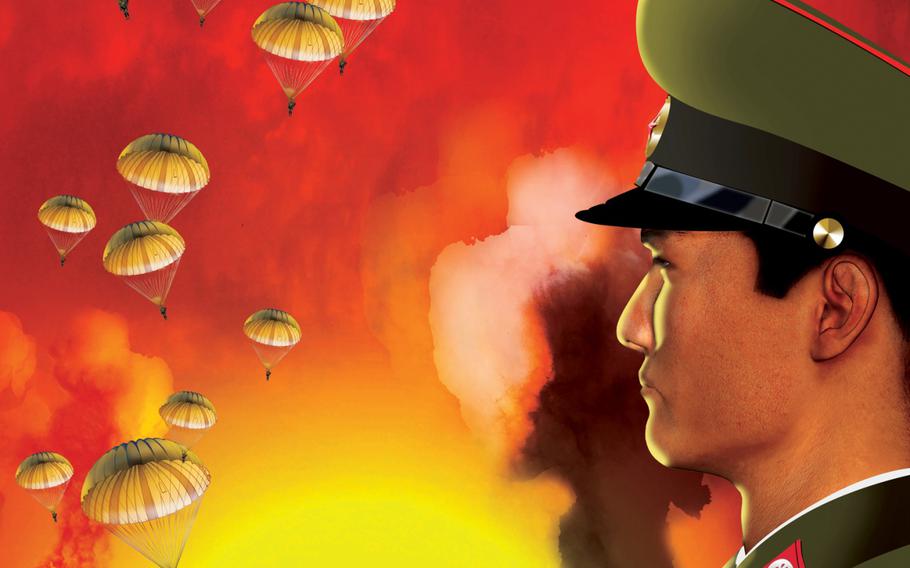Living
Hollywood taps North Korea as its new go-to bad guy
Stars and Stripes March 9, 2013

Photo illustration (by Bev Schilling/Stars and Stripes)
Hollywood has been embracing a villain as nightmarish as Freddy Krueger, as darkly mysterious as Darth Vader and more politically correct than the Russians and Mideast terrorists who had been the favored bad guys.
When the “Red Dawn” remake was released in November (it came out on DVD Tuesday), with North Korea in the invading enemy role that the Soviet Union filled in the 1984 original, it became the latest of a half-dozen Western-made feature films that have portrayed the provocative communist country as the heavy over the past decade.
The list of titles where North Koreans — or the country itself — play varying forms of movie miscreants includes “Die Another Day” (2002), “Team America: World Police” (2004), “Stealth” (2005), “Behind Enemy Lines II: Axis of Evil” (2006) and “Salt” (2010). That doesn’t include about a dozen South Korean-made movies and a slew of documentaries.
There were apparently only three mainstream movies with the North as the bad guy that were made in the previous 30-plus years, dating back to the 1970s Korean War comedy-drama “M*A*S*H.”
Experts on film and the cloistered country say its characterization is the result of several factors.
First and foremost, they say, is that North Korea has for decades proven itself to be an unpredictable, dangerous country full of venom and bluster.
“North Korea is a bad guy in the real world, since the country is always making trouble on a global level through its development of nuclear weapons, its exporting of weapons of mass destruction to the Middle East, its being involved in illegal drug trafficking and so on,” said Lee Woo Young, a professor of North Korean films at the University of North Korean Studies in Seoul.
Johannes Schonherr, author of “North Korean Cinema — A History,” agreed: “North Korea sets itself up as an ideal target: strange propaganda abounding, weird military-focused leader, blustering about their invincibility all the time, always trying to provoke international headlines with threats or actually small-scale military attacks on U.S.- ally South Korea.
“Which moviemaker wouldn’t love an enemy like that?” he said. “It offers everything a movie bad guy needs to be convincing.”
In addition, the other traditional bad guys have become less attractive to Hollywood. The Cold War is over, so the Russians’ dark star has faded. While 9/11 and the wars in Iraq and Afghanistan would seem to make Middle Eastern countries an easy target for a screenwriter, cultural sensitivities and political correctness serve as a strong counterbalance.
“The Soviet Union has dissolved and there’s no more communist bloc in Eastern Europe, so Hollywood needed to look for another bad guy,” said Jay Soh, a film professor at the Seoul Institute of the Arts in Ansan.
Although American filmmakers featured Middle Eastern terrorists a number of times in the 1990s, he said, a backlash from and on behalf of Muslims made featuring them problematic.
“Hollywood was looking for a new enemy that was not going to inflame people … so they chose North Korea as the enemy of the U.S.,” Soh said.
“(The movies) show North Korea as the last stronghold of ‘The Iron Curtain,’ and the sort of ‘totalitarian evil’ that existed before, in the movies of the 1980s.”
While China might seem to be an obvious choice, the bottom line is a factor, since Beijing controls what films make it to theaters in the world’s most populous country.
For example, when the “Red Dawn” remake was filmed, the invading army originally was Chinese. However, in postproduction, elaborate editing was reportedly done to change the invaders into North Koreans because the film’s backers feared China would not allow it to be shown there otherwise.
“I believe that China has replaced the Soviet Union as the enemy,” Schonherr said. “However, the economic ties between the U.S. and China are very strong. Therefore, Hollywood can’t portray China as the enemy. North Korea is the weird little dictatorship that has to stand in for China.”
Simon Fowler, a British film critic who specializes in Asian cinema and runs a website devoted to North-made movies (northkoreanfilms.com), said North Korea is an easier choice.
“You’re unlikely to upset anybody’s feelings, like China (which is) now contributing to the production of a lot of Western movies,” he said.
Jung Jae Hyung, a professor in the Department of Film and Digital Media at Dongguk University in Seoul, said potential profits aside, “North Korea is being stereotyped, but the North has given good reasons for that.”
Fresh off a satellite launch that many believe was cover for a test of long-range missile capabilities, and with young leader Kim Jong Un apparently following the same provocative path of his late father, Kim Jong Il, North Korea could be a popular movie villain for years to come.
“I do believe that this image of North Korea being the bad guy will continue … because hard-liners there want to continue the same sort of policies of Kim Jong Il with his son,” Soh said.
“I think that as long as they continue being hard-liners against Americans and the rest of the world, North Korea will definitely be seen as an evil symbol in all of Hollywood cinema,” he said.
If anyone feels guilty about making tiny North Korea the new Hollywood heavy, Schonherr said turnabout is fair play.
“North Koreans are trained by North Korean movies to see the U.S. as their enemy,” he said. “North Korea wants to be the enemy, and Hollywood is happy to assign that role to them.”